Neurobics: Low-Effort Cognitive Stimulation!
 Neurobics is a unique approach to brain training developed from the latest findings in neurobiology. According to one popular approach, Keeping Your Brain Alive, the core idea is this:
Neurobics is a unique approach to brain training developed from the latest findings in neurobiology. According to one popular approach, Keeping Your Brain Alive, the core idea is this:
“Neurobic exercises use your five physical senses and your emotional sense in unexpected ways and encourage you to shake up your everyday routines. Neurobics don’t require paper and pen or isolating yourself with puzzles. Everyday life is the Neurobic Brain gym. They can be done anywhere, anytime in offbeat, fun and easy ways while you’re getting up, commuting, working, eating, shopping or relaxing. They are designed to help the brain manufacture its own nutrients that strengthen, preserve and grow brain cells.”
Some examples:
- Take a different route when commuting to work this morning
- Brush your teeth with the other hand
- Use just the sense of touch when unlocking a door (don’t look at the lock)
- Move your waste basket at work
- Sit someone different at the dinner table tonight
Tiny changes with a significant and positive neurochemical impact. Any exercise can be Neurobic as long as it involves your senses in a new context, demands attention and breaks routine. This means we can design our own! The Keep Your Brain Alive Program was developed by Larry Katz a well-known Duke University Neurobiologist and includes 83 very specific things to try.
Interested to hear from readers that do Neurobics. What exercises do you do and how have you built them into your daily routine?
Categories: Books, Cognitive Decline, Lifestyle, Manage Emotions, Mental Focus, Perception Tags: brain training, experiential learning
Does Raising a Child Make You Smarter?
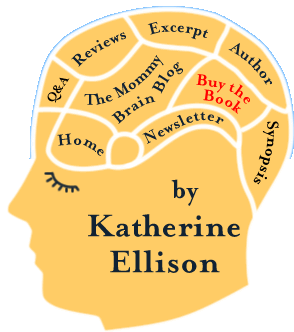 Absolutely, if you are the Mother! At least that is the argument made Katherine Ellison in her book the Mommy Brain: How Motherhood Makes Us Smarter.
Absolutely, if you are the Mother! At least that is the argument made Katherine Ellison in her book the Mommy Brain: How Motherhood Makes Us Smarter.
Motherhood gives a brain boost in many ways including face reading, multi-tasking, fearlessness, serenity, empathy, assertiveness and mental dexterity. These improvements in both IQ and EQ come from a combination of new hormones, motivation and practice that motherhood brings about.
The book is well founded in the latest neuroscience. It upends the stereotype of mothers checking their brains at the delivery room doors. Check out the Mommy Brain site by clicking on the graphic to the right.
Categories: Books, IQ and EQ, Lifestyle, Manage Emotions, Mental Focus, Parent, Perception Tags: embodied cognition, EQ
Right Words Boost Infants’ Mental Development
 One question new parents ask is what natural things can I do to stimulate the development of my baby’s brain and make them smarter? There are number of very simple things that have good scientific evidence behind them. For example, new research from Northwestern University confirms that talking to your baby accelerates their cognitive development. Using the right words improves their ability to categorize objects.
One question new parents ask is what natural things can I do to stimulate the development of my baby’s brain and make them smarter? There are number of very simple things that have good scientific evidence behind them. For example, new research from Northwestern University confirms that talking to your baby accelerates their cognitive development. Using the right words improves their ability to categorize objects.
It has long been held that talking to your baby is good for mental development but the Northwestern research found that this is so for the very young, only 2-4 months. The researchers write:
“We suspect that human speech, and perhaps especially infant-directed speech, engenders in young infants a kind of attention to the surrounding objects that promotes categorization,” said Waxman, a co-author and professor of psychology. “We proposed that over time, this general attentional effect would become more refined, as infants begin to cull individual words from fluent speech, to distinguish among individual words and kinds of words, and to map those words to meaning.”
Hearing object-correlated words influences infants’ cognition even in the first few months of life! The key is to clearly use “real words” or ones that properly pick out objects.
It is not clear what the longer term brain-boosting advantages of this are but the ability to categorize is fundamental to how we think.
To get started you may want to check out the talking pointers from the Center for Early Literacy. If you use this technique, or others to boost your baby’s brain development, please share your experience with other readers by leaving a comment.
Categories: Child, Cognitive Development, Lifestyle, Parent Tags:
Double Dip: Take A Ride on the Brain Bike
 Physical exercise, especially cardio, is good technique for improving brain function. There is no doubt about that. So is specially designed cognitive training software that gives your brain a workout by solving problems, meeting perceptual challenges and even playing games. Imagine combining the two – exercising while working with cognitive training software – to get a double dose of brain training in a single session. That is exactly what the NeuroActive Bike does.
Physical exercise, especially cardio, is good technique for improving brain function. There is no doubt about that. So is specially designed cognitive training software that gives your brain a workout by solving problems, meeting perceptual challenges and even playing games. Imagine combining the two – exercising while working with cognitive training software – to get a double dose of brain training in a single session. That is exactly what the NeuroActive Bike does.
Combing their NeuroActive cognitive training software with an exercise bike the Brain Center of America is the first to introduce a brain bike.
They are available in some health clubs in France, the US and Canada. Here is a list. A few schools in the US are introducing them. For example, I found this story and photo (to the right) about Madison School in Naperville, Illinois.
I have not seen any studies on the effectiveness of this type of double dipping but will keep an eye out. In the meantime I am interested to hear from readers that have taken a ride on the Brain Bike.
Categories: Cognitive Decline, Lifestyle, Memory and Learning, Mental Focus, Perception, Software, Training Tags: brain training, cognitive fitness, exercise
Use Off Prescription Drugs to Enhance Cognition?
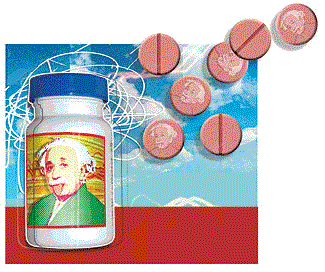 Drugs designed for Alzheimer’s disease, ADHD, narcolepsy and other neurological disorders are finding new off-prescription use as cognitive enhancers. Students, professionals and many other citizen have reported using prescription-only drugs such as Aderaal (a form of ritlan for ADHD) and Modafinil (a stimulant used to treate narcolepsy) to boost mental performance. Typical non-medical uses of these “smart drugs” include efforts to improve concentration, enhance memory and create mental energy.
Drugs designed for Alzheimer’s disease, ADHD, narcolepsy and other neurological disorders are finding new off-prescription use as cognitive enhancers. Students, professionals and many other citizen have reported using prescription-only drugs such as Aderaal (a form of ritlan for ADHD) and Modafinil (a stimulant used to treate narcolepsy) to boost mental performance. Typical non-medical uses of these “smart drugs” include efforts to improve concentration, enhance memory and create mental energy.
Using smart drugs without a prescription is illegal but they are easily available on the internet and from street sources. As reported in the commentary, Toward responsible use of cognitive-enhancing drugs by the healthy, in the prestigious scientific journal Nature:
“Today, on university campuses around the world, students are striking deals to buy and sell prescription drugs such as Adderall and Ritalin — not to get high, but to get higher grades, to provide an edge over their fellow students or to increase in some measurable way their capacity for learning.”
And it is not just students but professors, physicians, lawyers, engineers and many other professionals.
Not surprising there is little or no scientific evidence that these drugs work to enhance cognitive performance of healthy people. However, the subjective effect of increased mental energy seems unmistakable.
With many people experimenting with smart drugs, and a growing number of calls for studying their use to achieve peak cognitive performance, they will be a frequent topic in the Next Brain Blog.
Please leave a comment if you have experience in using smart drugs that you want to share with other readers.
Source: Image of Smart Drugs
Categories: College Student, Lifestyle, Memory and Learning, Mental Focus, Professional Tags: mental energy, smart drugs
Want to Dramatically Improve Self-Control?
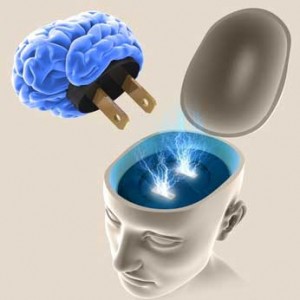 Then learn to manage your mental energy!
Then learn to manage your mental energy!
Science has made considerable inroads over the last few years defining, measuring and understanding the role mental energy plays in cognitive performance. Mental energy is defined as the combination of the ability to do mental work, the motivation for doing that work and your subjective feeling of fatigue. Key findings about mental energy include:
- We only have so much to use – it is a limited resource
- Exercising self-control or regulating our thoughts, emotions and behavioral responses burns considerable mental energy – much more than other cognitive processes such as learning and decision-making
- Running low on mental energy means loss of impulse control
- We can do specific things to replenish our supply of mental energy
Given the central role that mental energy (and its management) plays in cognitive performance it will be a frequent topic on the Next Brain blog.
Techniques for getting started in managing your mental energy include:
- Measuring your level of self-control and other cognitive tendencies that make extensive use of mental energy
- Journaling to understand how you wisely (or not) you use mental energy throughout the day
- Planning or budgeting your mental energy so you don’t set goals or engage in activities that result in sever depletion
- Developing habits that naturally restore your supply
Little things make a big difference when it comes to managing mental energy.
Categories: Executive Function, Lifestyle, Manage Emotions, Mental Focus, Training Tags: mental energy
DASH Diet + Aerobic Exercise = 30% Improvement in Brain Function
 According to a news release by the American Heart Association, a diet developed to improve blood pressure combined with aerobic exercise over a four month period appears to improve the mental functioning of older overweight adults. Researchers claim mental functioning improved by 30%. Quoting the news release:
According to a news release by the American Heart Association, a diet developed to improve blood pressure combined with aerobic exercise over a four month period appears to improve the mental functioning of older overweight adults. Researchers claim mental functioning improved by 30%. Quoting the news release:
“Researchers assessed mental functioning with a battery of neuropsychological tests, including Executive Function-Memory-Learning and Psychomotor Speed. These tests measure cognitive skills involving manipulation of ideas and concepts and planning ahead. The tests were given before and after the four-month treatment program.”
The diet plan is called DASH (dietary approaches to stop hypertension) and involves:
- Eating more fruits, vegetables, whole grains, fish, poultry, nuts and foods rich in magnesium, potassium, and calcium
- Cutting back on red meats high total-fat foods and sweets
If you want to give it a try there are specific guidelines, recommendations and even food plans on The Dash Diet Plan Eating site.
The aerobic exercises were basic but supervised and took place for 30 minutes three times per week.
It is important to note that you have to do both the diet and exercise to get the improvement in mental functioning. Control groups that did one or the other, or nothing showed no improvement in mental functioning. These type of combination effects (doing two or more interventions to get a boost in cognitive performance) are common and will be frequently covered on the Next Brain Blog.
Source: Exercise and Diet Image
Categories: Cognitive Decline, Diet, Executive Function, Lifestyle, Memory and Learning, Older Adult, Other, Problem Solving Tags: exercise, fruit
Is Your Next Brain in Fact Your Heart?
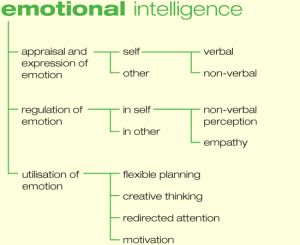 Daniel Goleman popularized the notion of Emotional Intelligence in 1995 in his best selling book by the same name. The idea is that a lot of what counts as smarts comes from our ability to perceive and manage emotions in ourselves and others. This is the foundation for self control and healthy relationships and leads to a successful life. The focus on emotional thinking versus rational or logical thinking as a key to intelligence was a huge paradigm shift that is still unfolding today.
Daniel Goleman popularized the notion of Emotional Intelligence in 1995 in his best selling book by the same name. The idea is that a lot of what counts as smarts comes from our ability to perceive and manage emotions in ourselves and others. This is the foundation for self control and healthy relationships and leads to a successful life. The focus on emotional thinking versus rational or logical thinking as a key to intelligence was a huge paradigm shift that is still unfolding today.
There is no doubt that understanding and manging emotions is a key for improving learning, decision-making, creativity, collaboration and other cognitive skills. Emotional intelligence will be a frequent topic on the Next Brain Blog. In an earlier post I provided links to quick and in-depth surveys that let you measure your emotional quotient (EQ) or level of emotional intelligence. In this post we will start to examine techniques for improving it.
For a quick introduction to how to develop your EQ check out the HELPGUIDE’s post on Five Key Skills for Building Emotional Intelligence. Although there are literally thousands of websites, books and other resources for learning about EQ I like this site. It demonstrates that emotional intelligence is rooted in common-sense life skills such as quickly reducing stress and managing your own feelings. No rocket science but the fact is that we often don’t take the time to develop specific skills to do these kinds of things and that impedes our cognitive performance.
Check the site out and please comment on the specific techniques you use to develop EQ.
Source: Emotional Intelligence Image
Use Your Body to Improve Thinking Instantly!
 Over the last 20 years scientists have made good progress in understanding how our bodies impact the way we learn, think, solve problems manage emotions and do other mental tasks. A new view has emerged called embodied cognition that argues how our minds work is strongly determined by how our bodies interact with the world.
Over the last 20 years scientists have made good progress in understanding how our bodies impact the way we learn, think, solve problems manage emotions and do other mental tasks. A new view has emerged called embodied cognition that argues how our minds work is strongly determined by how our bodies interact with the world.
Embodied cognition has practical implications for improving cognitive performance and will be a frequent topic on the Next Brain Blog. For example, taking simple actions such as literally stepping back when faced with a tough problem or more complex actions such as taking a walk lead to better results.
This is an exciting result because it shows a very simple actions can immediately improve the performance of our minds and brains!
Talking and thinking with our hands, how we sit or hold our arms (body posture) and any sort of short-duration physical activity have all be shown to improve various aspects of thinking, problem solving and learning.
Take for example the 2007 study that was recently blogged about as, Unravel Problems by Folding Your Arms, in Psychology Today. The idea that folding your arms could in fact help you solve hard problems may seem a bit simplistic but there is some neuroscience behind it:
“Crossing our arms, Friedman and Elliot argued, sends our a brains a “proprioceptive cue.” “Proprioception” is the scientific term for our perception of the relative position of our body parts. When our arms are crossed it tells the brain to buckle down and get ready to work through a difficult problem. So next time you’re faced with a protracted project or a tough task, cross your arms to see it to a speedy, successful conclusion. Just remember, while our brains perceive crossed arms as a sign of perseverance, others may perceive it as a sign of boredom. Body language can mean many different things to different people in different situations-it’s part of what makes the field so exciting!”
If you are still skeptical watch the highly effective problem solvers around you. What do they do with their bodies when they are stumped?
Source: Image adapted from Moving Bodies.
Categories: Lifestyle, Memory and Learning, Problem Solving Tags: embodied cognition
Resistance Training Once per Week Improves Mental Functioning by 10+%
In the Next Brain Blog we track down and report on a full-range of ways to improve the function and longevity of your brain and mind. There are many studies that prove physical exercise is good for your brain fitness and mental health.
But what type should you do, what specifically does it improve and how long do the effects last? A new piece of research reported in the Archives of Internal Medicine on Resistance Training and Executive Function gives some specific answers.
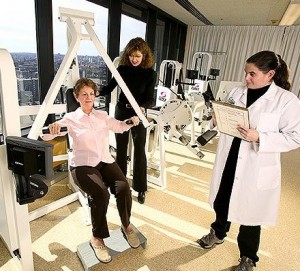 They found that for older female adults resistance training (dumbbells and weight machines) one or twice a week for a year improved their abilities to plan, make decisions, focus and resolve conflicts by more that 10%. These mental tasks all belong to what is called your executive function.
They found that for older female adults resistance training (dumbbells and weight machines) one or twice a week for a year improved their abilities to plan, make decisions, focus and resolve conflicts by more that 10%. These mental tasks all belong to what is called your executive function.
This is an impressive finding because it gives specifics on the type of exercise and the impact it will have. More to the point:
You can get a big boost in mental performance from a modest weekly investment in resistance training.
You don’t need to go to the gym or use fancy weight machines – low cost home exercise equipment will do the trick.
By the way, you can measure the efficiency of your executive function using the Stroop Test. I will blog on that later in the month.
Source: Image
Categories: Cognitive Decline, Decision Making, Lifestyle, Mental Focus, Older Adult, Training Tags: exercise, Stroop Test
